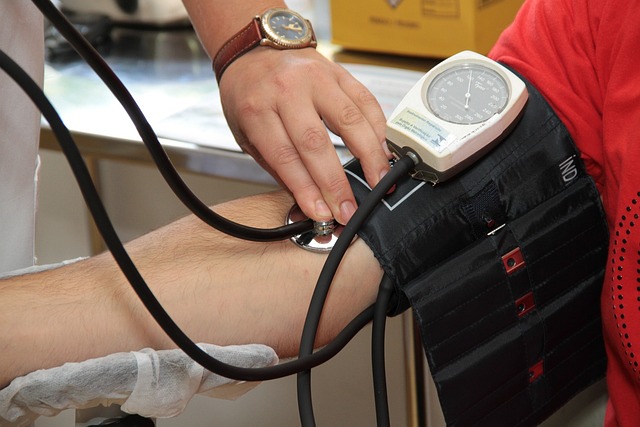Navigating Certified Medical Record Translation Compliance in the UK Legal System
The UK's healthcare system relies on the precision and legal compliance of Medical Record Translation UK services to effectively communicate with patients whose primary language isn't English. These translations are legally binding, ensuri…….

The UK's healthcare system relies on the precision and legal compliance of Medical Record Translation UK services to effectively communicate with patients whose primary language isn't English. These translations are legally binding, ensuring clear and accurate communication between healthcare providers, patients, and any involved legal entities, which is crucial for second opinions, insurance claims, or specialist care where medical histories must be fully understood. Professional translators, who are native speakers well-versed in medical terminology, adhere to standards set by the NHS, ICO, and other regulatory bodies to balance complex medical language with clear, understandable text, maintaining the integrity of healthcare services while upholding legal compliance within diverse UK communities. The certified translations undergo rigorous quality checks and are accompanied by a certificate of accuracy, affirming the translator's competence and honesty, and are essential for maintaining patient confidentiality and adhering to the Data Protection Act 2018 and GDPR. For organisations in need of these services, it is imperative to select providers with expertise, a commitment to quality, ethical standards, and specialised experience in healthcare documentation translation, ensuring secure handling of sensitive medical information in compliance with UK regulations.
When legal matters intersect with healthcare, precise communication is paramount. In the UK, where diversity thrives, medical record translation becomes a critical bridge between patient care and the law. This article delves into the essential role of certified translations in this realm, guiding readers through the certification process for legal use, the scope of medical documentation translation needs within the UK legal system, and the best practices for selecting a dependable translation service. Medical Record Translation UK is a specialized field where accuracy and compliance are not just preferred but required, ensuring the integrity of patient information and legal proceedings. Understanding these nuances is key for healthcare providers, legal professionals, and patients alike.
- Understanding the Necessity of Certified Medical Record Translation in the UK
- The Certification Process for Legal Use: Ensuring Accuracy and Compliance
- Navigating the Scope of Medical Documentation Translation Needs in the UK Legal System
- Best Practices for Choosing a Reliable Translation Service for Medical Records in the UK
Understanding the Necessity of Certified Medical Record Translation in the UK

In the complex interplay of healthcare delivery and legal compliance within the UK, the necessity of certified medical record translation cannot be overstated. Medical Record Translation UK is a specialized service that transcends mere linguistic conversion; it ensures that patients for whom English is not the first language receive care without barriers. This is crucial in a multicultural society where communication failures could compromise patient safety and legal integrity. The UK’s National Health Service (NHS) operates under stringent confidentiality and data protection laws, which necessitate that any translation of medical records be precise and accurate to maintain the sanctity of patient information. Certified translations provide legally binding assurance that the translated content accurately reflects the original, thereby facilitating seamless communication between healthcare providers, patients, and legal entities when necessary. This is particularly pertinent in scenarios such as second opinions, insurance claims, or when obtaining specialist care, where medical history must be clear and comprehensible to all parties involved.
The process of Medical Record Translation UK is governed by specific standards set forth by regulatory bodies like the NHS and the Information Commissioner’s Office (ICO). Professional translators, who are often native speakers with expertise in medical terminology, are tasked with this responsibility. They must navigate the delicate balance between medical jargon and everyday language without compromising on accuracy or meaning. The end goal is to produce a translation that stands up to legal scrutiny while remaining accessible to individuals who may not have proficiency in English. This commitment to precision and confidentiality underpins the critical role of certified medical record translation in upholding the integrity of healthcare services and ensuring legal compliance within the UK’s diverse communities.
The Certification Process for Legal Use: Ensuring Accuracy and Compliance

When legal proceedings intersect with healthcare, the precision of medical record translation becomes paramount. In the UK, where legal documents must be accurately interpreted to facilitate justice and patient care, certified translations of medical records play a critical role. The certification process for legal use is meticulously designed to ensure that the translated content is both accurate and compliant with the legal standards set forth by the relevant authorities. Translation professionals specializing in Medical Record Translation UK undergo rigorous training to handle sensitive patient information, adhering to the highest ethical and professional standards. They are adept at navigating complex medical terminology and legal jargon, ensuring that every nuance is accurately conveyed. This process involves a series of quality checks and verification steps, where translators compare the source text with the translated version to confirm that the meaning remains intact. Additionally, they must include a certificate of accuracy, declaring that the translation is complete, faithful to the original document, and free from errors. This certification attests to the translator’s proficiency and integrity, making it an indispensable tool in legal settings where medical records are used as evidence or for administrative purposes. The stringent requirements for Medical Record Translation UK ensure that healthcare professionals, legal practitioners, and regulatory bodies can trust the translated documents to be both linguistically and legally sound, fostering a system where accuracy and compliance are upheld without compromise.
Navigating the Scope of Medical Documentation Translation Needs in the UK Legal System

In the UK, the translation of medical documentation for legal purposes is a specialized task that demands precision and compliance with both legal and medical standards. Medical record translation in the UK is not merely a linguistic exercise; it encompasses understanding the nuances of medical terminology alongside the strict requirements of the legal framework governing such documents. The UK’s legal system, particularly within the context of healthcare, necessitates translations that are both accurate and legally sound to ensure patient confidentiality and the integrity of medical records. Certified translators who specialize in this field undergo rigorous training to navigate the intricacies of medical jargon and legal language, ensuring that every translation meets the necessary regulatory standards, such as the Data Protection Act 2018, which safeguards personal data. The scope of these translation needs is vast, ranging from patient notes to complex clinical trial reports, all requiring a translator with expert knowledge to bridge the gap between healthcare providers and legal entities, facilitating seamless communication that upholds the integrity of medical documentation in legal settings across the UK.
Best Practices for Choosing a Reliable Translation Service for Medical Records in the UK

When selecting a translation service for medical record translation in the UK, it is imperative to prioritise accuracy and expertise. The translator must hold the appropriate Certified Translator status or be part of a professional association such as the Institute of Translation & Interpreting (ITI) or the Chartered Institute of Linguists (CIOL). This ensures that they adhere to high standards of quality and ethical practice, which is critical when dealing with sensitive medical information. Additionally, opt for a service with proven experience in translating healthcare documentation, as they will be well-versed in medical terminology and the nuances of language that are vital for maintaining the integrity of the patient’s data. Verify their credentials and ask for samples or references from past medical record translation projects to gauge their competence and reliability.
Furthermore, due diligence is essential when assessing a translation service’s capacity for confidentiality. The UK’s Data Protection Act 2018 and the General Data Protection Regulation (GDPR) dictate stringent privacy requirements. A reputable medical record translation service will not only comply with these regulations but also offer bespoke solutions that align with your organisation’s specific needs, ensuring the confidentiality of patient records is upheld throughout the translation process. Confirm their use of secure systems for data transfer and storage, and ensure they are equipped to handle the complexities of medical terminology across different languages to provide precise and reliable translations. This commitment to quality, compliance, and privacy is paramount when entrusting a translation service with your medical records in the UK.
In conclusion, the importance of certified medical record translation in the UK’s legal domain cannot be overstated. Accurate and compliant translations are pivotal for effective communication and legal compliance within the healthcare sector. The certification process, as detailed in this article, ensures that medical documentation is not only linguistically precise but also legally sound. For professionals operating within the UK’s legal system, understanding the scope of translation needs and adhering to best practices when selecting a translation service is crucial for maintaining the integrity of patient care and legal proceedings. Professionals should prioritize services that specialize in Medical Record Translation UK to navigate the complexities of this critical task. By doing so, they can uphold the confidentiality and legality of sensitive medical information across linguistic barriers, thereby enhancing patient outcomes and legal fairness.






